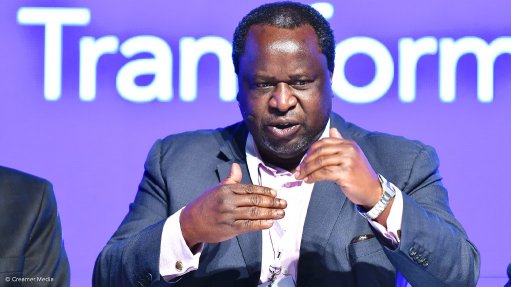
Finance Minister Tito Mboweni
Photo by: Creamer Media's Donna Slater
Finance Minister Tito Mboweni confirmed on April 14 that the National Treasury was exploring all funding avenues to finance programmes aimed at tackling the Covid-19 pandemic, including funding available from international finance institutions such as the International Monetary Fund (IMF) and the World Bank.
He stressed, however, that the South African government would not seek Budget support from the IMF, which would typically be accompanied by structural adjustment programmes. Instead, the aim was to access Covid-19-related packages, including about $60-million in World Bank support for specific interventions to combat the virus.
“The IMF has released a basic Q&A on the kinds of facilities which are available. We are not looking for Budget support. We will be looking for the Covid-19-specific packages that we can access and we are talking to them about that,” Mboweni said.
“We are looking at programmes which will not be accompanied by any structural adjustment programme, because I think we know what to do – we know what our structural reform programme is. It’s important to note that this is an international resource mobilisation in addition to our domestic resources.”
Government would also be approaching the New Development Bank and the African Development Bank to assess what other funding options were available. “We will leave no stone unturned in that regard.”
Speaking ahead of an April 15 special Cabinet meeting, convened specifically to deliberate on economic policy proposals developed by Cabinet’s Economic Cluster, Mboweni indicated that announcements regarding any international resource mobilisation would be made only after funding transactions were concluded.
UPDATED BUDGET
The Minister was also planning to release an update to the 2020 Budget, which would consolidate all reprioritised spending plans for the 2020/21 fiscal year and include new revenue projections in light of the economic slowdown not anticipated when the 2020 Budget was released and precipitated by South Africa’s response to the Covid-19 pandemic.
The IMF’s April 2020 World Economic Outlook, also released on April 14, estimates that the South African economy will contract by 5.8% in 2020, while the South African Reserve Bank’s revised estimate is for a contraction of 6.1%. Modelling done by Business for South Africa is even more pessimistic, projecting a slump of between 8% and 10% in 2020, and the loss of more than one-million jobs.
Mboweni described the Covid-19 pandemic as one of the greatest challenges ever faced by South Africa.
“It is three simultaneous shocks. It is a health shock, which will stretch the resources of our healthcare system to its limit. It is a global economic shock, which will substantially reduce global growth and consequently external demand, and it is a domestic economic shock, because our domestic policies will reduce economic activity, both from a demand side and a supply side.”
He indicated that the economic policy response that would be deliberated upon by Cabinet would include both new and existing elements.
One existing component highlighted by the Minister was the inclusion of an accelerated agenda for structural reforms, including the restructuring the network industries, the development and nurturing of small businesses as engines of growth and employment and broad-based measures to lower the cost of doing business.
This emphasis on structural reforms was in line with a call made by Business for South Africa’s economics working group leader Martin Kingston for the Covid-19 response and future stimulus plan to be calibrated to the ongoing reform of State companies and key sectors such as electricity.
“We recognise that going into the future we are going to have to restructure our economy very aggressively – not just as business, but as a country – and we are already engaged in that discussion with government and with organised labour and civil society to ensure that we can maximise our economic trajectory when we come out of Covid-19, which we anticipate only being probably by 2021, and then rebuilding the economy on a more efficient basis going forwards,” Kingston said during a Business for South Africa webcast on April 15.
Among the new options under consideration were temporary upward adjustments to the child support grant and the old age pension, as well as a loan-guarantee scheme to allow banks to support small businesses in distress with the aid of a government guarantee.
“It is clear that, given the economic downturn and the impact of the coronavirus, we are going to be forced into a situation where we have to make many reallocations across the whole government system,” Mboweni said.
He added that the reallocations would be guided by the need to ensure that the Health Department has sufficient resources to tackle the virus and to direct funds the way of growth-enhancing activities.